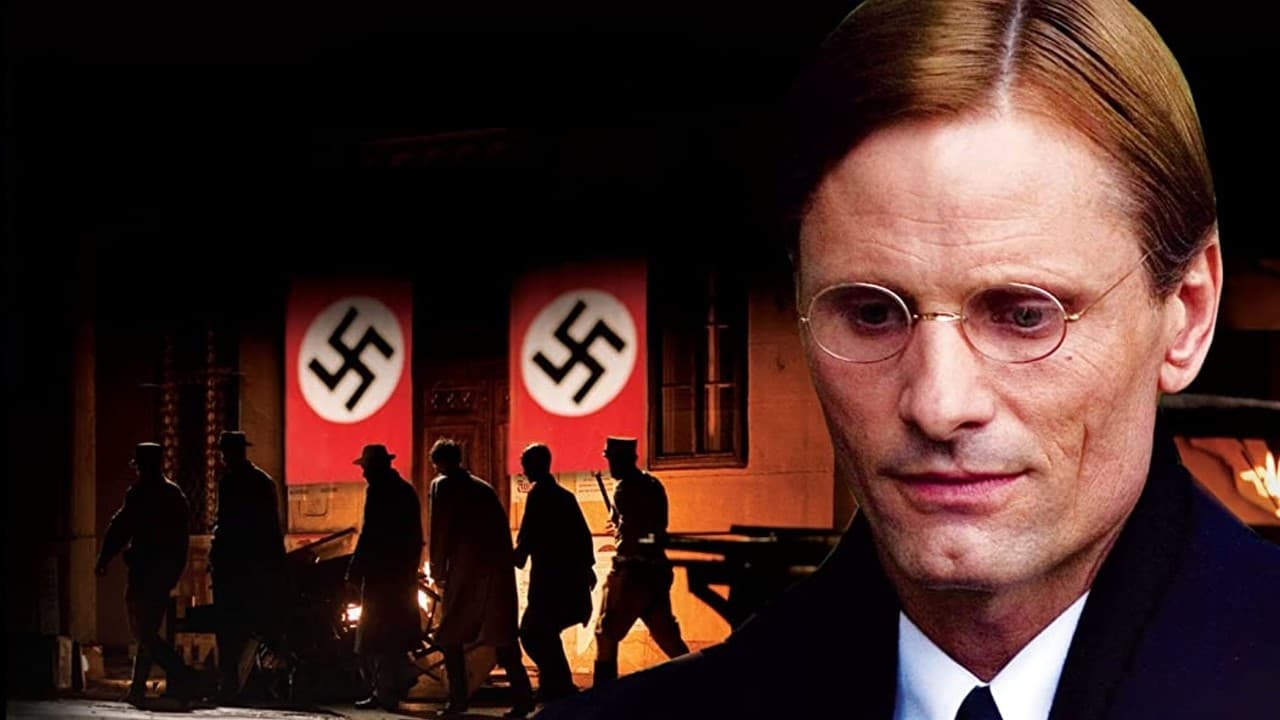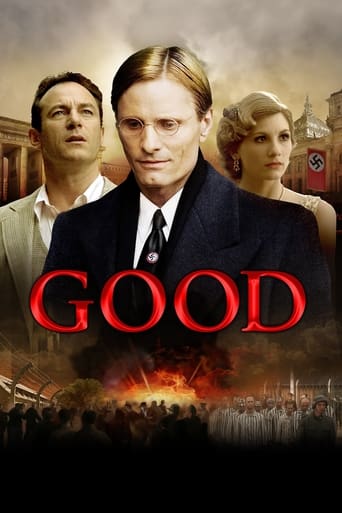

This is ultimately a movie about the very bad things that can happen when we don't address our unease, when we just try to brush it off, whether that's to fit in or to preserve our self-image.
... View MoreJust intense enough to provide a much-needed diversion, just lightweight enough to make you forget about it soon after it’s over. It’s not exactly “good,” per se, but it does what it sets out to do in terms of putting us on edge, which makes it … successful?
... View MoreThe tone of this movie is interesting -- the stakes are both dramatic and high, but it's balanced with a lot of fun, tongue and cheek dialogue.
... View MoreOne of the film's great tricks is that, for a time, you think it will go down a rabbit hole of unrealistic glorification.
... View Morea film about the Third Reich. about choices, attitudes and fear. about decisions. in fact, about the human nature. Viggo Mortensen does a beautiful work for the art to give precise sketches of gestures and words of a man who becomes hostage of history. because this is the inspired way to translate a state who , for the viewer, could be an obscure hypothesis. it is not the picture of a weak man but the image of a man out of his rules, front to a strange world. this is the source of poetry of this bitter and heavy film.
... View More"Good" starts quietly, but ends powerfully. It goes to the heart of our sense of right and wrong.The movie is set in Germany a few years before WW2. John Halder (Viggo Mortenson) is a WW1 veteran and university lecturer who lives in a small apartment with his wife, two children and a demanding, invalid mother.He has written a novel about euthanasia, which the new Nazi government finds is in accord with their ideas, and John is offered a post within the SS. Although he is anything but a Nazi, John nonetheless enjoys the advantages the position offers him although it compromises his relationship with his friend, Maurice Glückstein (Jason Isaacs), a Jew.John also leaves his wife and marries a sexy young student, Anne (Jodie Whittaker); he is a man who seems easily seduced in love and in life. Eventually, in the film's grim finale, John is forced to confront his lack of firmness and the realities of the Nazi regime.The story shows in microcosm how the Nazis seduced the Germans, and how they accepted the loss of personal freedoms and worse for what seemed to be for the good of the nation, a better life, and maybe, just not to rock the boat. However, there was a price to pay and once ensnared there was no turning back.The film probably has more relevance to people who know some history of the times, because it helps explain why John acts the way he does - although not stated overtly, his actions are driven by underlying fear. There are little touches that the filmmakers don't feel necessary to explain such as why the previous occupants of Anne and John's new apartment have left so suddenly - a knowledge of the times would suggest that they were Jews who had been evicted.Some scenes are painful to watch, especially as John fails to help Maurice as the Nazis ramp up their persecution of the Jews. Here, the film seems to challenge the viewer, "What would you do in his place"? Would you have the courage to swim against the tide of events? John is basically a decent man, however he is too pliable, too apathetic, and does not act until it is too late."Good" may seem slow to some, "Iron Man 2" it is not. But I feel that the time it takes to build its characters pays off in the end - we become involved. One of the most asked questions in history is how did the Nazis manage to sway ordinary Germans to their cause? This film gives part of the answer in an intimate and accessible way. As British philosopher Edmund Burke famously said, " The only thing necessary for the triumph of evil is for good men to do nothing".
... View MoreOne might have thought that the Third Reich is a subject which has been done to death in the cinema, yet occasionally a film turns up which is able to shed new light on the subject. "Good" came out in 2008, the same year as "The Reader", another film about Nazism, but one which was much more widely publicised. John Halder is a young lecturer in the literature department of a German university in the 1930s. (Although the film is set in Germany, the first names of most characters are anglicised- for example John and Maurice rather than Johann and Moritz). When the Nazi Party comes to power in 1933, Halder seems an unlikely convert to their doctrines, as he is relatively liberal in his politics and not at all anti-Semitic- indeed, his closest friend Maurice Glückstein is Jewish. He is angry when he is ordered to stop teaching the works of Jewish authors like Marcel Proust. Yet Halder is seduced into going along with the Party. He first comes to the notice of the Nazi hierarchy when he publishes a novel in support of euthanasia, and is commissioned by them to carry out research into the same subject. He is persuaded that taking out Party membership will advance his career and is given a rank in the SS. This position is at first purely honorary, but later he is charged with more responsibilities. Halder's involvement in the party leads to the end of his friendship with Maurice; when his friend asks him for help in obtaining an exit visa so he can leave Germany, Halder fails to do so out of moral cowardice. The film ends in 1942 with Halder working in a concentration camp. The story is told against the background of Halder's personal life, including his difficult relationship with his elderly mother and the breakdown of his first marriage following an affair with a student, who becomes his second wife. What is striking about Halder's gradual moral corruption is the methods used by the Nazis to get him to co-operate. They never need to resort to threats or bullying. Nobody ever barks "Ve haff vays und means ." or some similar phrase. Even notorious real-life Nazis like Philipp Bouhler and Adolf Eichmann come across as quite reasonable. Halder is won over by flattery, by appeals to his self-interest and by playing on his quite genuine idealism. Although the title "Good" is intended ironically, there must have been many in the early thirties who persuaded themselves that the National Socialist movement could be a force for good, that it could lead to a genuine sense of national rebirth and renewal in Germany and that the its regrettable anti-Semitism was merely a temporary mania which would burn itself out once the Party had consolidated itself in power and established a firmer control over its wild young stormtroopers. When Halder hesitates about joining the Nazi Party he is won over by the arguments of his second wife Anne that the party needs good men like himself as members in order to ensure a better future for the country. I was not very impressed by Viggo Mortensen in the last film I saw him in, "A Perfect Murder", so I am happy to say that he is much better here as Halder, the man whose personal road to Hell is paved with the best of intentions. I also liked Jason Isaacs as Maurice. The theme of the film- a once liberal man seduced by Nazism, was also treated in a German- language film, Istvan Szabo's "Mephisto". I wouldn't rank "Good" quite as highly as Szabo's film, but I certainly preferred it to "The Reader" which I found empty, barren and lacking any new insights into its grim subject-matter. "Good", by contrast, does have something of interest to say about the Nazi era and, by extension, also about the temptation to collaborate with evil which arises whenever people are forced to live under totalitarian regimes. 7/10
... View MoreI'm really surprised this film had been so badly discredited.There are a few flaws, namely with character development, especially when analysing Anna, and Handler's (Mortensen) ex wife. Their characters appear integral to the story, yet influence over Handler and his actions are often overlooked. The story jumps through time periods, which artistically I can understand, however leaves the viewer to neglect the effect of time on Handler which is an integral element to the story - and the fundamental message this film is trying to portray.However, the message is strong and delivered well. It contends with traditional notions of the mindless brutality of Nazis and Germans, and probably more accurately reflects the role of an 'ordinary German' living in this society. Too often are films based on assumptions of stereotype and the black and white portrayal of good and evil. The only flaw in message is that Handler seem's to be the exception, the only 'good' in a sea of evil, but the film is thought provoking nonetheless. It echoes similar themes surrounding the role of the perpetrator and perpetrator guilt that have become iconically associated with the Reader. It places the image of a Nazi perpetrator in a context, which is vital in understanding the circumstances in which these actions were carried out. So many films in this genre are centred around the victim experiences and developments in Germany from 1933-39, and it is interesting to see the take from the perspective of a German. The image of a Nazi is deconstructed, it emphasises the Intentionalist theory in a top-down execution of the Final Solution. It shows an average German, caught up in a corrupt society - highlighting the weakness and vulnerability, as well as potential ignorance of the average German citizen - emphasised in the last scene.Mortensen is fantastic in this, his acting is convincing and emotive. Unfortunately I feel other cast members may discredit his role, and the whole tone of the movie. However, this film is one of the most sincere and interesting modern depictions of the Holocaust I've seen, and is refreshing change to sea of trauma currently loved by Hollywood.
... View More